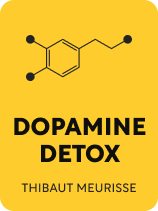

This article is an excerpt from the Shortform book guide to "Dopamine Detox" by Thibaut Meurisse. Shortform has the world's best summaries and analyses of books you should be reading.
Like this article? Sign up for a free trial here.
How do you do a dopamine detox? How do you build healthy habits that will last a lifetime?
Dopamine is useful for our survival, especially when it comes to food and reproduction. But it’s not useful when it makes us pick up our phones to scroll through social media when important work needs to be done. The solution: a dopamine detox.
Check out how to do a dopamine detox and break free from distractions.
Strategies for Success
Thibaut Meurisse’s book Dopamine Detox offers a three-step process to learn how to do a dopamine detox successfully:
First, identify activities you find addictive. He recommends thinking about activities or behaviors that you can’t imagine going without. These are the behaviors most likely to cue your brain to release dopamine.
(Shortform note: When people think of addiction, they most often think of drugs or alcohol, but there are numerous non-substance addictions (also known as behavioral addictions) that people struggle with daily, ranging from social media to exercise. However, psychologists don’t agree about what should be considered an addiction vs. an overindulgence. Some argue that addiction has become overused in everyday speech and thus advocate for the narrower definition of addiction as “a neurological dependence on outside chemicals not normally found in the brain.” Within this definition, you could be addicted to alcohol, for example, but not social media.)
Second, create barriers that make your addictive activities harder to access. For example, leave your phone in another room or use focus apps that block distracting websites. You can also make it easier to engage in desirable behaviors. For example, if you want to focus on working out, leave your workout clothes and equipment out so you see them right when you wake up.
| How to Build Healthy Habits That Last In Atomic Habits, James Clear, recommends four strategies you can use to help change behaviors and build habits that stick. First, make the habit obvious. You can do this by creating a cue or trigger that reminds you to perform the habit. For example, if you want to make a habit of reading before bed, you can leave a book on your nightstand as a cue to remind you to read. Second, make the habit attractive. You can do this by coupling the habit with something enjoyable. For example, if you want to make a habit of exercising, you can plan to listen to your favorite podcast every time you work out. Third, make the habit easy. You can do this by reducing barriers to the habit and making it as simple as possible to perform. For example, if you want to make a habit of saving money, set up an automatic monthly transfer to your savings account. Finally, make the habit fulfilling. You can do this by linking the habit to a feeling of accomplishment or by providing a tangible reward such as a treat or a break. For example, if you want to make a habit of meditating, you can reward yourself with a cup of tea after your meditation session. |
Third, start your day without stimulation. Meurisse recommends setting up a morning routine that prioritizes focus over external stimulation, setting the tone for the rest of the day. Come up with two or three activities that you can do immediately after waking up that help you focus.
(Shorftorm note: Many TikTok users are also promoting the idea of a “low dopamine morning routine.” This trend suggests delaying the release of dopamine by avoiding using your phone for the first hour after waking up. Proponents of the routine recommend putting your phone on the other side of the bedroom, completing a low-stress task first thing in the morning, and replacing screen time with physical activities. There’s some evidence to suggest that starting your day this way can lead to increased productivity and improved overall well-being.)

———End of Preview———
Like what you just read? Read the rest of the world's best book summary and analysis of Thibaut Meurisse's "Dopamine Detox" at Shortform.
Here's what you'll find in our full Dopamine Detox summary:
- Why society suffers from a constant state of sensory overload
- Why dopamine is to blame for our inability to focus and accomplish goals
- How to do a dopamine detox to regain the ability to focus






